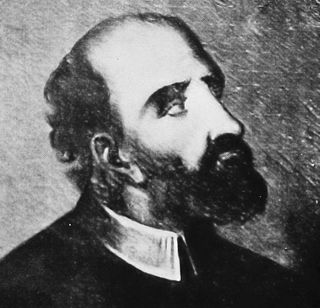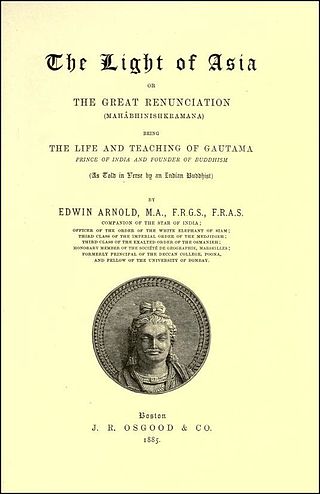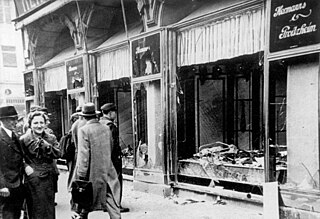Related Research Articles
An oratorio is a musical composition with dramatic or narrative text for choir, soloists and orchestra or other ensemble.

Giovanni Animuccia was an Italian composer of the Renaissance who was involved in the heart of Rome's liturgical musical life. He was one of Giovanni Pierluigi da Palestrina's most important predecessors and possibly his mentor. As maestro di capella of St Philip Neri's Oratory and the Capella Giulia at St Peter's, he was composing music at the very center of the Roman Catholic Church, during the turbulent reforms of the Counter-Reformation and as part of the new movements that began to flourish around the middle of the century. His music reflects these changes.
Franz Sparry was a composer of the Baroque period.

Howard Lindsay Goodall is an English composer of musicals, choral music and music for television. He also presents music-based programmes for television and radio, for which he has won many awards. In May 2008, he was named as a presenter and "Composer-in-Residence" with the UK radio channel Classic FM. In May 2009, he was named "Composer of the Year" at the Classic BRIT Awards.

Dudley Buck was an American composer, organist, and writer on music. He published several books, most notably the Dictionary of Musical Terms and Influence of the Organ in History, which was published in New York City in 1882.

Undine Eliza Anna Smith Moore, the "Dean of Black Women Composers", was an American composer and professor of music in the twentieth century. Moore was originally trained as a classical pianist, but developed a compositional output of mostly vocal music—her preferred genre. Much of her work was inspired by black spirituals and folk music. Undine Smith Moore was a renowned teacher, and once stated that she experienced "teaching itself as an art". Towards the end of her life, she received many awards for her accomplishments as a music educator.

The Light of Asia, or The Great Renunciation (Mahâbhinishkramana), is a book by Sir Edwin Arnold. The first edition of the book was published in London in July 1879.

Classical music of the United Kingdom is taken in this article to mean classical music in the sense elsewhere defined, of formally composed and written music of chamber, concert and church type as distinct from popular, traditional, or folk music. The term in this sense emerged in the early 19th century, not long after the United Kingdom of Great Britain and Ireland came into existence in 1801. Composed music in these islands can be traced in musical notation back to the 13th century, with earlier origins. It has never existed in isolation from European music, but has often developed in distinctively insular ways within an international framework. Inheriting the European classical forms of the 18th century, patronage and the academy and university establishment of musical performance and training in the United Kingdom during the 19th century saw a great expansion. Similar developments occurred in the other expanding states of Europe and their empires. Within this international growth the traditions of composition and performance centred in the United Kingdom, including the various cultural strands drawn from its different provinces, have continued to evolve in distinctive ways through the work of many famous composers.

Athalia is an English-language oratorio composed by George Frideric Handel to a libretto by Samuel Humphreys based on the play Athalie by Jean Racine. The work was commissioned in 1733 for the Publick Act in Oxford – a commencement ceremony of the University of Oxford, which had offered Handel an honorary doctorate. The story is based on that of the Biblical queen Athaliah. Athalia, Handel's third oratorio in English, was completed on 7 June 1733, and first performed on 10 July 1733 at the Sheldonian Theatre in Oxford. The Bee reported that the performance was "performed with the utmost Applause, and is esteemed equal to the most celebrated of that Gentleman's Performances: there were 3700 Persons present".

A Child of Our Time is a secular oratorio by the British composer Michael Tippett, who also wrote the libretto. Composed between 1939 and 1941, it was first performed at the Adelphi Theatre, London, on 19 March 1944. The work was inspired by events that profoundly affected Tippett: the assassination of a German diplomat by a young Jewish refugee in 1938, and the Nazi government's reaction to the assassination which was in the form of a violent pogrom against Germany's Jewish population: Kristallnacht. Tippett's oratorio deals with these incidents in the context of the experiences of all oppressed people, and it carries a strongly pacifistic message of ultimate understanding and reconciliation. The text's recurrent themes of shadow and light reflect the Jungian psychoanalysis which Tippett underwent in the years immediately before he wrote the work.
James P. Clarke (1807/08–1877) was a Canadian organist, conductor and composer. He was the first person to receive a bachelor's degree in music in North America. He is best known for his work Lays of the Maple Leaf (1853) and for leading several of Toronto's earliest musical organizations.
Die Jakobsleiter is an oratorio by Arnold Schoenberg that marks his transition from a contextual or free atonality to the twelve-tone technique anticipated in the oratorio's use of hexachords. Though ultimately unfinished by Schoenberg, the piece was completed and prepared for performance by Schoenberg student Winfried Zillig at the request of Gertrude Schoenberg.
A roulade is a type of music ornamentation. The term has been used with some variation in meaning. While the term has had some usage in instrumental music, it is most frequently used in the context of vocal music to refer to a florid embellishment of several musical notes sung on a single syllable. The word has sometimes been used interchangeably with the term coloratura to refer to any difficult vocal run requiring great vocal dexterity, or as a synonym for or a specific type of virtuosic melisma. The term roulade has also been used more specifically to refer to the ornamental practice of splitting up the melodic line of a piece of music into many smaller notes.
Charles Sanford Skilton was an American composer, teacher and musicologist. Along with Charles Wakefield Cadman, Blair Fairchild, Arthur Nevin, and Arthur Farwell, among others, he was one of the leading Indianist composers of the early twentieth century.

Louis Plaidy was a celebrated German piano pedagogue and compiler of books of technical music studies.

Dinesh Subasinghe is a Sri Lankan composer, violinist, and music producer. He composed Karuna Nadee, a Buddhist oratorio, and re-introduced a lost, ancient musical instrument known as the ravanahatha to Sri Lanka. He is also a film and television composer whose works integrate western and eastern classical music with electronic music, Buddhist music, folk music, traditional orchestral arrangements, and world music genres. From 2002 to 2009 he led the pop classical band, Dee R Cee Members.
Gioas re di Giuda is an Italian-language oratorio libretto by Pietro Metastasio written in 1735 for imperial court composer Georg Reutter the younger and later set by at least 25 composers. The plot is based on the life of King Joash of Judah.
Howard Elbert Smither was an American author, musicologist and historian of music. He is the uncle of musician Chris Smither and younger brother of the late Romance Language professor William J. Smither (1916-2007).
William Spark was an English musician, writer, composer and organist based in Leeds.
References
- ↑ Smither, Howard E. (2000). A History of the Oratorio: The Oratorio in the Nineteenth and Twentieth Centuries, p. 453. University of North Carolina Press
- ↑ Orr, N. Lee (2008). Dudley Buck, p. 98. University of Illinois Press